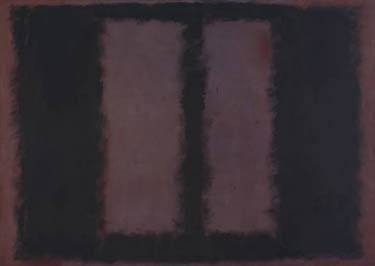
Gay Marriage Equality symbol used on social media

Mark Rothko, Black on Maroon, 1958, Tate Gallery
Nihilism as a psychological state will have to be reached, first, when we have sought a “meaning†in all events that is not there: so the seeker eventually becomes discouraged. Nihilism, then, is the recognition of the long waste of strength, the agony of the “in vain,†insecurity, the lack of any opportunity to recover and to regain composure—being ashamed in front of oneself, as if one had deceived oneself all too long.—This meaning could have been: the “fulfillment†of some highest ethical canon in all events, the moral world order; or the growth of love and harmony in the intercourse of beings; or the gradual approximation of a state of universal happiness; or even the development toward a state of universal annihilation—any goal at least constitutes some meaning. What all these notions have in common is that something is to be achieved through the process—and now one realizes that becoming aims at nothing and achieves nothing.— Thus, disappointment regarding an alleged aim of becoming as a cause of nihilism: whether regarding a specific aim or, universalized, the realization that all previous hypotheses about aims that concern the whole “evolution†are inadequate (man no longer the collaborator, let alone the center, of becoming).
Nihilism as a psychological state is reached, secondly, when one has posited a totality, a systematization, indeed any organization in all events, and underneath all events, and a soul that longs to admire and revere has wallowed in the idea of some supreme form of domination and administration (—if the soul be that of a logician, complete consistency and real dialectic are quite sufficient to reconcile it to everything). Some sort of unity, some form of “monismâ€: this faith suffices to give man a deep feeling of standing in the context of, and being dependent on, some whole that is infinitely superior to him, and he sees himself as a mode of the deity.—“The well-being of the universal demands the devotion of the individualâ€â€”but behold, there is no such universal! At bottom, man has lost the faith in his own value when no infinitely valuable whole works through him; i. e., he conceived such a whole in order to be able to believe in his own value.
Nihilism as psychological state has yet a third and last form.
Given these two insights, that becoming has no goal and that underneath all becoming there is no grand unity in which the individual could immerse himself completely as in an element of supreme value, an escape remains: to pass sentence on this whole world of becoming as a deception and to invent a world beyond it, a true world. But as soon as man finds out how that world is fabricated solely from psychological needs, and how he has absolutely no right to it, the last form of nihilism comes into being: it includes disbelief in any metaphysical world and forbids itself any belief in a true world. Having reached this standpoint, one grants the reality of becoming as the only reality, forbids oneself every kind of clandestine access to afterworlds and false divinities—but cannot endure this world though one does not want to deny it.
What has happened, at bottom? The feeling of valuelessness was reached with the realization that the overall character of existence may not be interpreted by means of the concept of “aim,†the concept of “unity,†or the concept of “truth.†Existence has no goal or end; any comprehensive unity in the plurality of events is lacking: the character of existence is not “true,†is false. One simply lacks any reason for convincing oneself that there is a true world. Briefly: the categories “aim,†“unity,†“being†which we used to project some value into the world—we pull out again; so the world looks valueless.
— Friedrich Nietzsche, The Will to Power
Quoted directly from Fred Lapides.





Please Leave a Comment!